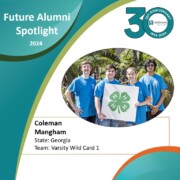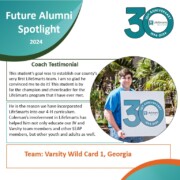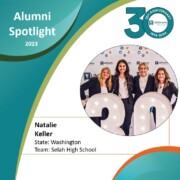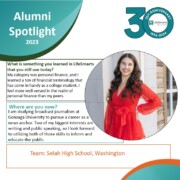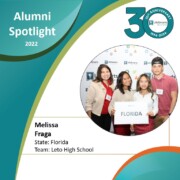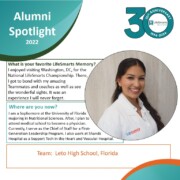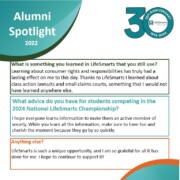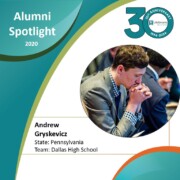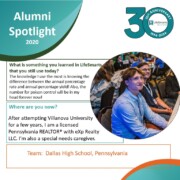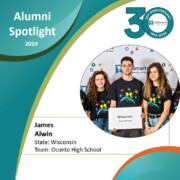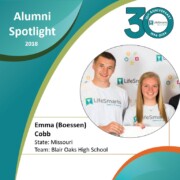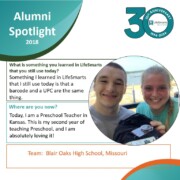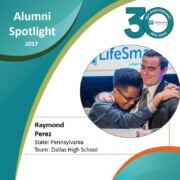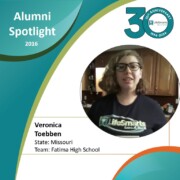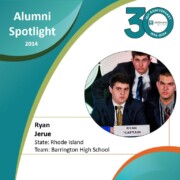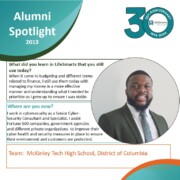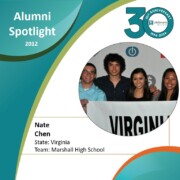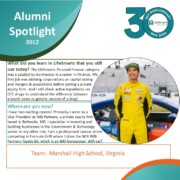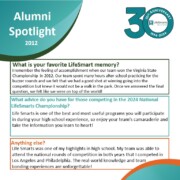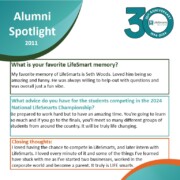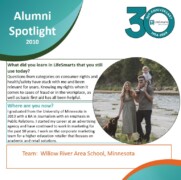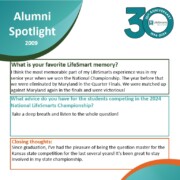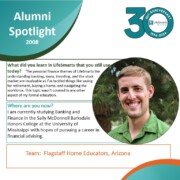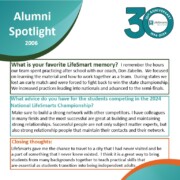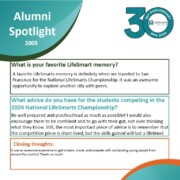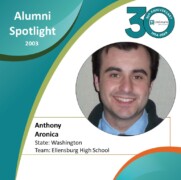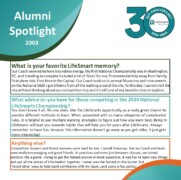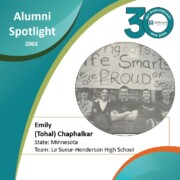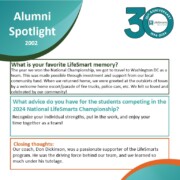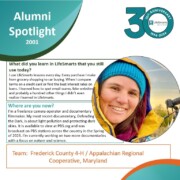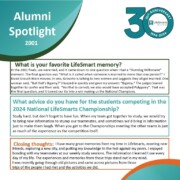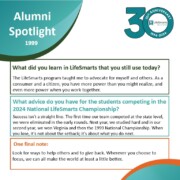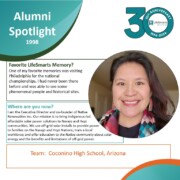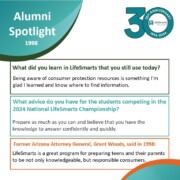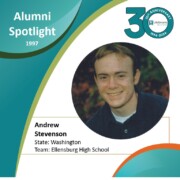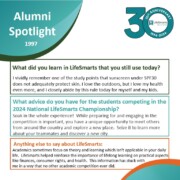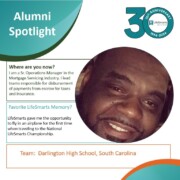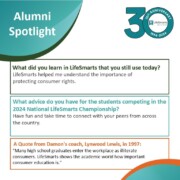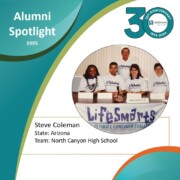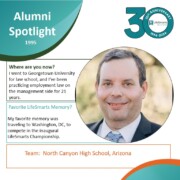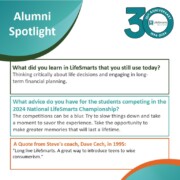Meet two of our new Future Alumni!
Meet one of our future alumni, Shelby Brewer! Shelby has been in LifeSmarts for two years and is instrumental in prepping, planning, and coordinating all team activities! Not to mention that she brings her team fresh baked goods for their practices!
Meet one of our future alumni, Coleman Mangham! Coleman helped establish his county’s very first LifeSmarts team, and his involvement in LifeSmarts helped educate our JV and Varsity team members, as well as being an incredible member of the LEAP team!
Meet LifeSmarts alumni across the years!
Natalie Keller, who competed on the 2023 National LifeSmarts Champion team from Selah High School in Washington, offers this advice to current competitors: “My advice is to form a strong bond with your teammates. Getting along well with your fellow team members will help you work together more effectively and handle stressful situations. Plus, it will make your trip more fun!”
Melissa Fraga, who competed on the 2022 National LifeSmarts Champion team from Leto High School in Florida, offers this advice to current competitors: “I hope everyone learns information to make them an active member of society. While you learn all the information, make sure to have fun and cherish the moment because they go by so quickly.”
Lily Martin, who competed on the 2021 National LifeSmarts Champion team from Webster County 4-H in Kentucky, offers this advice to current competitors: “Meet as many people as you can and soak in the knowledge, it really will come in handy!”
Andrew Gryskevicz, who competed on the 2020 National LifeSmarts Champion team from Dallas High School in Pennsylvania, offers this advice to current competitors: “Cramming the night before or even the day of a competition is never a bad option. You can never know to much.”
James Alwin, who competed on the 2019 National LifeSmarts Champion team from Oconto High School in Wisconsin, offers this advice to current competitors: “Don’t forget to have fun. You’ve already done something beyond other people your age, so enjoy it. Worry less about cramming in facts that you may not remember and instead focus on meeting new people from across the country and making memories that you will remember.”
Emma (Boessen) Cobb, who competed on the 2018 National LifeSmarts Champion team from Blair Oaks High School in Missouri, offers this advice to current competitors: “As you prepare to compete at the 2024 National LifeSmarts Championship, just remember to relax and do your best. Make sure you take it all in and really enjoy the experience.”
Raymond Perez, who competed on the 2017 National LifeSmarts Champion team from Dallas High School in Pennsylvania, offers this advice to current competitors: “Make it fun! There’s no reason that “studying” should be boring. The championship is fun, so make practice fun. Know that you’ll be using this information for the rest of your life. Unlike other competitions, this one prepares you for more than just answering random questions. It’s helpful to know everything you learn through LifeSmarts.”
Veronica Toebben, who competed on the 2016 National LifeSmarts Champion team from Fatima High School in Missouri, offers this advice to current competitors: “Always keep learning and know that you are wildly capable.”
-
Matthew LaMontagne, who competed on the 2015 National LifeSmarts Champion team from Barrington High School in Rhode Island, offers this advice to current competitors: “My first two state competition were in the Rhode Island state house, in chambers right off the main rotunda. In my first year we were congratulated as winners by Gov. Chafee, and in my second year it was hosted by our future Governor, and we used the state legislature chambers for our awards ceremony. It was special place to compete and win state titles in a venue like this.”
-
Ryan Jerue, who competed on the 2014 National LifeSmarts Champion team from Barrington High School in Rhode Island, offers this advice to current competitors: “Study. Study. Study. The most effective preparation for me were the practice quizzes and reading all the wild stories out there. Places like Fraud.org and the CPSC are two that come to mind where there’s lots of information.“
-
Leslie Ogu, who competed on the 2013 National LifeSmarts Champion team from McKinley Technology High School in the District of Columbia, offers this advice to current competitors: “Take the time to truly understand the material in a manner that you could teach it to other people, opposed to rote memorization. One solid way is to challenge one another to teach the material to the rest of the team. So, take it seriously, but don’t forget to have fun!“
-
Nate Chen, who competed on the 2012 National LifeSmarts Champion team from Marshall High School in Virginia, offers this advice to current competitors: “Life Smarts is one of the best and most useful programs you will participate in during your high school experience, so enjoy your team’s camaraderie and take the information you learn to heart!”
-
Hafsa Khanum, who competed on the 2011 National LifeSmarts Champion team from Crosby High School in Connecticut, offers this advice to current competitors: “Be prepared to work hard but to have an amazing time. You’re going to learn so much and if you go to the finals, you’ll meet so many different groups of students from around the country. It will be truly life changing.”
-
Camille (Blechinger) Crutcher, who competed on the 2010 National LifeSmarts Champion team from Willow River Area School in Minnesota, offers this advice to current competitors: “Be open to meeting new people outside of your teammates. Be the one to start a conversation with the person next to you; compliment them on their speed or knowledge. One simple interaction, in my case a comment about a t-shirt, could change the rest of your life. Maybe it’s a forever friend you make or maybe it’s the love of your life. Beyond just my husband – I’m still connected to those I met in 2010 in Miami. I will remember that trip and the experience of gathering with other students from across the country to compete for the rest of my life!”
-
Evan Wilson, who competed on the 2009 National LifeSmarts Champion team from Nickerson High School in Kansas, offers this advice to current competitors: “Take a deep breath and listen to the whole question!”
-
Zach Schierl, who competed on the 2008 National LifeSmarts Champion team from Flagstaff Home Educators in Arizona, offers this advice to current competitors: “Meet as many people as you can and soak in the knowledge, it really will come in handy!”
- Jared Watkins, who competed on the 2007 National LifeSmarts Champion team from Piedra Vista High School in New Mexico, offers this advice to current competitors: “In 2007, we lost an early round, our coach Ann George said we could win the easy way or the hard way (lose a round and win the consolation bracket). After the loss, she reminded us that, though we were taking the hard way, it was still a way and to stay confident, and we won the Championship. Remember, whether you take the easy way or the hard way, keep your head up!”
-
Jared Vasiliauskas, who competed on the 2006 National LifeSmarts Champion team from West Chicago High School in Illinois, offers this advice to current competitors: “Make sure to build a strong network with other competitors. I have colleagues in many fields and the most successful are great at building and maintaining strong relationships. Successful people are not only subject matter experts, but also strong relationship people that maintain their contacts and their network.”
- Kelli Margritz, who competed on the 2005 National LifeSmarts Champion team from Dawson County 4-H in Nebraska, offers this advice to current competitors: “Be well prepared and practice/read as much as possible! I would also encourage them to be confident and to go with their gut, not over-thinking what they know. Still, the most important piece of advice is to remember that the competition piece is short-lived, but the skills gained will last a lifetime!”
- Brad Anderson, who competed on the 2004 National LifeSmarts Champion team from Coffee County 4-H in Tennessee, offers this advice to current competitors: “Practice quizzing with distractions. Put on the TV or YouTube in the background while you attempt to simulate answering questions. Nothing worse than knowing the right answer but to freeze in the moment because of a small distraction. Also, remember LifeSmarts isn’t the end goal, always keep learning. A good way to stay fresh and gain broad exposure is to read trustworthy financial content and dive deep into unfamiliar topics you come across.“
- Anthony Aronica, who competed on the 2003 National LifeSmarts Champion team from Le Sueur-Henderson Ellensburg High School in Washington, offers this advice to current competitors: “You don’t know it all. No one does. Use the LifeSmarts opportunity as a really great chance to practice different methods to learn. When presented with so many categories of complicated rules, it is helpful to use multiple learning strategies to figure out how you learn best. Being in LifeSmarts will lead you towards habits that will help you for years after LifeSmarts. Always remember to have fun, because this information doesn’t go away as you get older, it just gets more interesting!”
-
Emily (Tohal) Chaphalkar, who competed on the 2002 National LifeSmarts Champion team from Le Sueur-Henderson High School in Minnesota, offers this advice to current competitors: “Recognize your individual strengths, put in the work, and enjoy your time together as a team!”
-
Tara (Roberts) Zebriskie, who competed on the 2001 National LifeSmarts Champion team from Frederick County 4-H/Appalachian Regional Cooperative in Maryland, offers this advice to current competitors: “Study hard, but don’t forget to have fun. When my team got together to study, we would try to bring new information to stump our teammates, and sometimes we’d bring in information just to make them laugh. When you get to the Championships meeting the other teams is just as much of the experience as the competition itself.”
- Giles Howlett, who competed on the 2000 National LifeSmarts Champion team from Frederick County 4-H/Appalachian Regional Cooperative in Maryland, offers this advice to current competitors: “Pick some relevant topics and do your own research to build questions on that topic for your team. Practice with any questions you can get from previous competitions and LifeSmarts materials.”
- Karl Sakas, who competed on the 1999 National LifeSmarts Champion team from Fairfax County 4-H in Virginia, offers this advice to current competitors: “Success isn’t a straight line. The first time our team competed at the state level, we were eliminated in the early rounds. Next year, we won Virginia and then the 1999 National Championship. When you lose, it’s not about the setback; it’s about what you do next.”
- Suzanne Singer, who competed on the 1998 National LifeSmarts Champion team from Coconino High School in Arizona, offers this advice to current competitors: “Prepare as much as you can and believe that you have the knowledge to answer confidently and quickly.”
- Andrew Stevenson, who competed on the 1997 National LifeSmarts Champion team from Ellensburg High School in Washington, offers this advice to current competitors: “While preparing for and engaging in competition is important, you have a unique opportunity to meet others from around the country and explore a new place.”
- Damon White, who competed in 1996 and was on the second National LifeSmarts Champion team from Darlington High School in South Carolina, offers this advice to current competitors: “Have fun and take time to connect with your peers from across the country.”
- Steve Coleman, who competed in 1995 and was on the first-ever National Champion team from North Canyon High School in Arizona, offers this advice to competitors 30 years later: “Take the opportunity to make great memories that will last a lifetime.”



